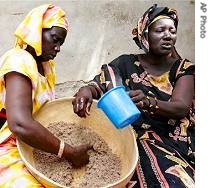2006年VOA标准英语-Young Rural Senegalese Women Face Divided Paths(在线收听)
By Phuong Tran
Fatick, Senegal
18 December 2006
Young rural women in Africa face harsh circumstances, as they prepare for adulthood. In this first part of a series on prospects faced by young African women, VOA's Phuong Tran reports from the Senegalese town, Fatick, about two teenage girls who are preparing to take very different roads, as they enter their twenties.

Anta Mbow, left, and Gueye Ndao Seck make couscous by hand, in Thiaroye, Senegal, 17 Sept 2006
She says it is her first time to try this tie-dye fabric-making process. Madrimdram is a 19-year-old student at a vocational school for girls who have dropped out of the formal school system.
She says it is not hard to do. She is from Fatick. She is in her final year of a three-year program to become a seamstress.
When asked about her parents, her first reply is that her parents are at home. However, it is actually her uncle who she calls her "parents."
"My father died five years ago and my mother died when I was two months old. I am an orphan and live with my uncle," she said. "After my mother died, my grandmother and uncle adopted me and I came here."
Here at the Fatick Girls' Vocational Training Center, more than 100 girls pay $3 a month to attend this government-subsidized program. They choose from classes in embroidery, baking, fabric making, cooking, and computer training. Most are like Madimdram and stopped going to school after about five years in primary school.
She says that she tried to take the exam after primary school to continue to secondary school. After she failed the exam twice, she came to the training program.
"I could not make it at the other school. I was not made for that type of school. I fit in much better in this program," concluded Madimdram.
Next door, a group is borrowing classroom space from the school for the day.
Eighty-five high-school girls from Fatick and its surrounding villages are divided into groups for a day workshop on leadership.
This is part of a scholarship program where they attend workshops, for which they receive an annual scholarship of about $200. A regional committee of educators chose the best students, from struggling families, to award scholarships.
The trainer reviews the morning's discussion about overcoming the difficulties female leaders face.
Soda Samb, a 19-year-old scholarship recipient, lives with her father, his two wives, brothers and sisters in Fatick. Even though her siblings work for her father's tailor shop, her parents let her go to school because they say she is smart and should not stay at home.
She says girls have the same rights as boys do. She says girls should not follow boys, but should lead.
When asked what she wants to do when she graduates from high school, Soda has little hesitation. Judge or lawyer, she replies.
Next door, at the vocational training school, Madimdram finishes her fabric dye and puts away her wash bin. When asked about her plans after finishing her program, she also replies quickly.
She says she wants to stay in Fatick as a seamstress, forever.